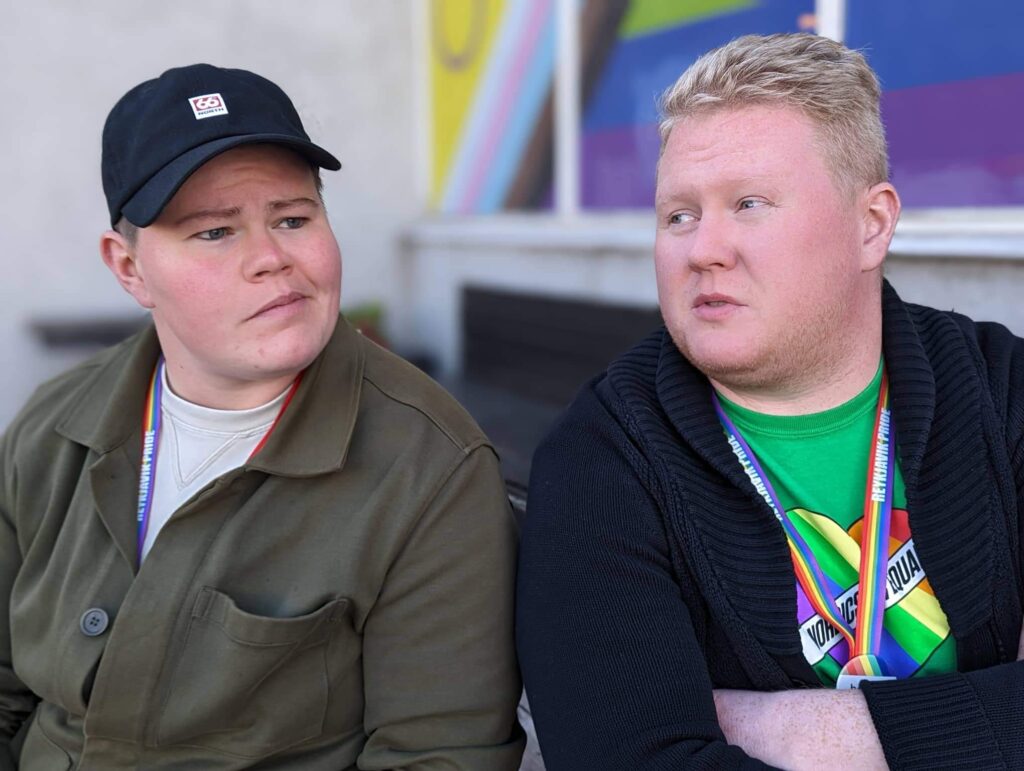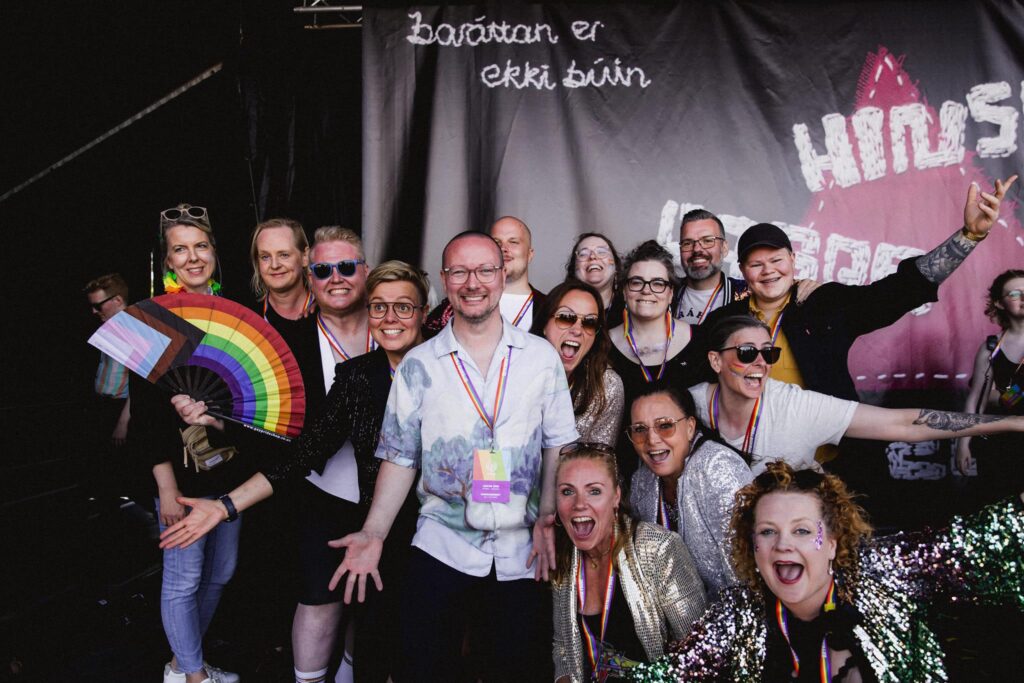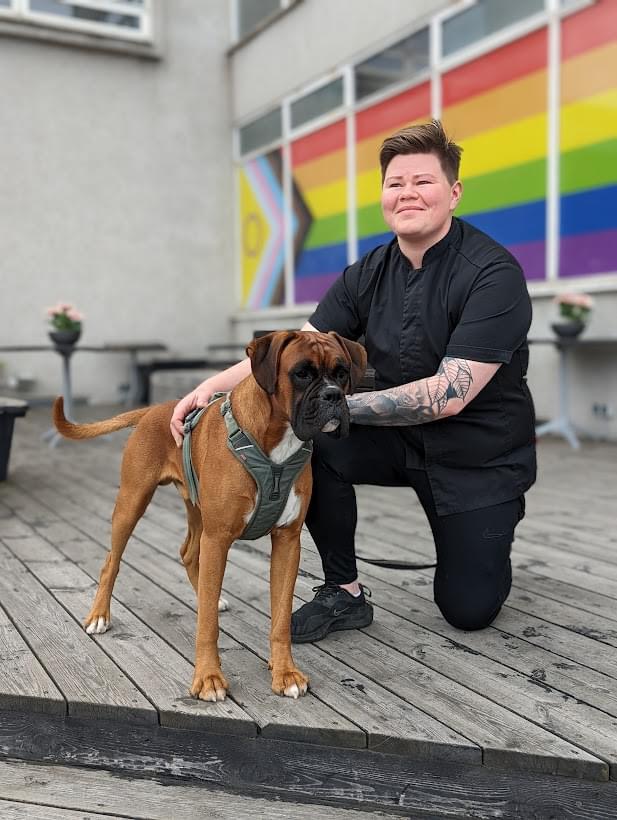Reykjavík Pride’s new president seeks to improve on a good thing.
By now it is probably common knowledge that Reykjavík Pride is one of Iceland’s largest festivals, sometimes even rivaling the number of attendees for Independence Day celebrations. Reykjavík Pride is a lot of things–a celebration, a protest, a show of solidarity, a demonstration of allyship, a concert and a party–and naturally, it takes many hands to keep things running smoothly.
Amazingly, Reykjavík Pride is run almost entirely by volunteers. One of those is its newly elected president, Helga Haraldsdóttir. She has been involved with the event since 2018 and as such, was already “very familiar with the work that needs to be done.” What then inspired her to go for the presidency?
I sought the position mostly because of encouragement from my fellow board members,” she says. “That really helped me make the decision. That was kind of the push I needed.”
Not that she was displeased with the way things had been run up until that point; on the contrary, she has nothing but praise for out-going president Gunnlaugur Bragi Björnsson. In fact, running for president didn’t even occur to her until he announced that he wouldn’t be running again.
“[He] was just very, very confident and good at what he did,” she says. “So there wasn’t a feeling of ‘I should take over, I should do this’. … When [he] and the rest of the board encouraged me to put my name in the hat I felt it was something I really wanted to do.”
A bigger tent
Praise for the outgoing president aside, Helga is not one to rest on Reykjavík Pride’s laurels. When asked in what directions she would like to take the event, she has a vision in mind.
“Reykjavík Pride has been held in Iceland since 1999 and we’ve evolved and learned a lot through the years,” she says. “Now it’s one of the biggest events in Iceland. I feel we need to keep the standards which are very high but at the same time it’s important that we develop new ways to reach the community and give more people and groups space. I’m really excited about it but of course, it’s also a big responsibility that I take very seriously.”
I feel we need to keep the standards which are very high but at the same time it’s important that we develop new ways to reach the community and give more people and groups space.
Being a volunteer herself, she also doesn’t forget who helps the event run.
“What makes Reykjavík Pride as amazing as it truly is are the volunteers, some of whom have put in so much work year after year. With the festival getting bigger every year we rely more and more on volunteers and their work is so important, but more volunteers means that we must find new ways of making sure that people know they are appreciated for all their efforts.”
Pride is first and foremost for and by the queer community
Of course, none of this would be possible without the involvement of the queer community itself. The event is for the community, and by the community, and so listening to that community is paramount to Helga.
“I would like to actively reach out to the community, to hear people’s opinions on what they would like to see,” she says. “It’s important for people to be able to just express themselves, talk about all of the good things or the bad things, because I think that way, we could hopefully get the most diverse opinions and comments and critiques about things and where we are heading. We are a group of many different minorities with different needs and perspectives. I find that maybe it’s a bit difficult to be putting pressure on people to get themselves actively involved, for things to evolve. We are not yet as diverse as we want to be and should be. But by reaching out and just having the conversations, I believe we can take bigger steps closer to unity.”

Love in the shadow of hate
Last summer’s Reykjavík Pride was a special one for a number of reasons. The year had seen a very small group of bigots, who usually confined their hate to Facebook, suddenly get a modest amount of media coverage. Annoying as that was, there was also a court case involving two young men accused of terroristic plotting; amongst their plans were speculations on how they could drive a large vehicle into crowds during Pride itself.
This was particularly harrowing, and was in the forefront of the minds of many of those who attended Pride last summer. Helga was among those attendees, and felt, like many others, that making the decision to march together–in solidarity with one another, in solidarity against hate–brought us closer together.
I want to create a space where everyone can feel free and comfortable to come forward with their ideas on how we can best operate Reykjavík Pride.
“Although there was more uncertainty [during last summer’s Pride], I feel that we as a community have grown stronger in spite of it,” she says. “Last Pride march was so big and so out and loud. I feel like we rose to the occasion. And that is powerful. Showing up and being happy and celebrating our queerness in the face of backlash.”

The captain will hear you now
Although next Reykjavík Pride commences August 6th of next year, if anything that gives us plenty of time to consider what kind of event we want to have; what we would like to see, to offer each other, to build together.
As said, Pride is by and for the queer community, first and foremost. If you’re a part of that community, you have the freedom and the power to help shape Pride into the event you would like it to be; something Helga emphasises at our interview’s closing.
“I really and very simply want to listen to people,” she says. “I think it’s not always easy to listen, especially when it’s criticism. This is what I want to try my best to do especially if my role is in any way like a captain of a ship. I want to create a space where everyone can feel free and comfortable to come forward with their ideas on how we can best operate Reykjavík Pride.”


